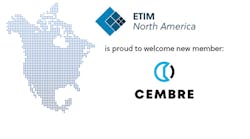The electrical industry continues to benefit from focusing its attention on the value of data and the development of standard processes for handling it as part of the endless quest to drive costs out of the electrical supply chain. Where the value of data directly affects compensation at some level in the channel, things get interesting, as seen in a new report on the seemingly dry, administrative subject of point-of-sale (POS) data.
The study, conducted by Channel Marketing Group for the National Electrical Manufacturers Representatives Association (NEMRA), Portsmouth, N.H., shows that widespread gaps in POS data policies and procedures make it difficult for manufacturers’ reps to be correctly compensated for their work, and traces out the causes and implications of the problem. Based on a survey of NEMRA member reps and manufacturers, the report “The State of POS in 2014” narrows in on the crux of the problem: large chain distributors operating central or regional distribution centers (DCs) receive sales support at the branch level from local independent manufacturers’ reps, but when the work results in a sale, the products are often shipped to the branch from a DC without a clear paper trail to identify which rep deserves the commission on the sale.
“All (reps surveyed) felt that they, and their salespeople, were not being fully compensated but that the ability to get to 100% was impossible due to quality of data, the inability to audit the information and the lack of concern by other channel stakeholders,” the report said.
This may seem like a problem with an obvious solution — have the distributors report sales at the branch level back to the manufacturer and share those reports with the reps to audit — but for a variety of reasons it often doesn’t happen that way. The Channel Marketing study looks at many of the reasons why, and makes suggestions for resolving the issue.
The implications of this dislocation for distributors are significant, especially for large distributors using a DC or hub-and-spoke model. The study found that reps often will direct business to those distributors that do a good job reporting on sales, or independents that operate only within one rep’s territory. Said the study:
“While the financial impact of POS is most easily identifiable at the independent manufacturer sales representative level due to compensation / commission issues, it also impacts distributors, as sales representatives shared that they at times redirect business to distributors from whom they know purchase information is easily reported and hence they will receive appropriate compensation.
“POS also financially impacts manufacturers as manufacturer sales reps may contravene manufacturer strategic initiatives to support selected distributors/national chains, potentially missing goals, and could impact compensation issues within the manufacturer (regional/national account management).
“Essentially, a percentage of manufacturer representatives, through their actions are saying, “If we cannot trust in manufacturer/distributor POS data, we will sell around those companies.”
Although the study found that for the large majority of manufacturers (88%) and reps (76%) POS data is relevant to less than 20% of their sales, the report suggests that resolving the questions around POS is an increasingly urgent need as distributor consolidation and growth funnel more of the industry’s sales through organizations using a distribution-center model.
Administrative burden
The time and effort involved in gathering, formatting and submitting point-of-sale data is hardly trivial, especially when you consider that most electrical distributors handle hundreds of product lines from manufacturers large and small. Despite a valiant effort a decade ago by the National Association of Electrical Distributors (NAED), St. Louis, to develop and promote a standardized format for POS and POT data submissions, most manufacturers have their own preferred formats and complying with those expectations further complicates the work of providing the data.
Independent reps and manufacturers face a similar administrative burden in tracking and reporting POS data. Reps estimated they spend eight hours or more per week on reconciling POS reports.
Trust issues
The study found a widespread belief among manufacturers that this administrative burden is part of the problem of getting POS data from distributors, but distributors take a different view. As with so many issues within the electrical products channel, the effective use of POS data turns on relationships between distributors and manufacturers — their trust in each other or lack of it.
The study found that manufacturers think distributors resist providing POS data because they don’t have the technical capabilities or the willingness to devote resources to filing the reports.
Fifty percent of manufacturers believe distributors don’t have the capabilities to gather the information; 35% feel distributors don’t want to share information; 23% believe distributors are not concerned about rep compensation; and only 20% believe it is a “trust” issue.
Distributors say it’s not a technical issue or reluctance to devote resources to the paperwork, it’s about their concerns over how the manufacturer will use the information, issues of privacy and trust (especially around identifying customers), and a lack of benefit from the manufacturer.
Point of transfer
One solution may be to increase use of point-of-transfer (POT) reports that show when a product is shipped from the distributor’s distribution center to the branch where the customer made the purchase, or transferred from inventory at another branch.
“Both manufacturers and reps feel that POT information is important as it enables the capturing of data from CDCs/RDCs as well as inter-branch/out-of-territory inventory transfers (but the primary intent relates to CDCs/RDCs.)”
Commodity quandary
The questions around POS data become more problematic when it comes to “commodity” products such as some types of conduit, fittings and wire, where distributors don’t maintain separate bins for functionally identical product from a number of manufacturers.
“In speaking with reps, distributors and manufacturers, the allocation methodology which is currently used by many appears to be the only efficient methodology. While not 100% accurate, many feel it comes “close,” especially if there is frequent enough communication amongst parties to recalibrate the percentages on a regular basis.”
Lost opportunities
More than 95% of the manufacturers surveyed use POS data for rep compensation, but there’s more to it than that, or could be. Manufacturers said they also use it to evaluate factory sales management and to estimate market share, but few (if any) take it further to use point of sale data to drive marketing efforts, sales management or market intelligence initiatives.
“Many manufacturers recognize this potential but do not have the resources or enough data to aggregate and act upon the information,” the study said.
A path forward
The study found that the vast majority of electrical distributors and manufacturers consider POS data important to compensating independent reps appropriately based on their local-market support.
“It is evident that a high percentage of distributors recognize the importance of appropriately compensating manufacturer sales representatives. The challenges become addressing the trust issue, the benefit for the distributor and standardizing and simplifying the data gathering process.”
The report concludes with recommendations for finding a resolution that shares the burden equitably by involving all parts of the industry. Suggestions include outreach by the NEMRA to other channel partners to develop a standardized format for POS data, the possible creation of an industry third-party organization to process POS reports, and encouraging manufacturers to provide distributors incentives for timely submission of POS and POT data. When asked if they would use a standardized format if it were developed by NEMRA, over 90% of manufacturers said they would.
Said the study, “While Point of Sale is a challenging topic due to a number of issues mentioned in this report, progress can be made through improved communications amongst trading partners, increased transparency between electrical distributors, electrical manufacturers and independent manufacturers’ reps and improved formatting/ standardization of information.”
The full report is available in the Member News section of NEMRA's Website. Otherwise, readers should call NEMRA at 800-446-3672 or email their request to [email protected]. More information and a copy of the full report will be available at the NEMRA Annual Conference in San Diego Jan. 28-31.









